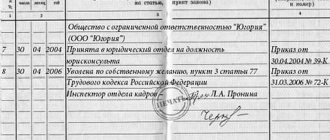18.06.2019
0
482
5 minutes.
When employed, each employee is required to perform certain duties in accordance with his position. They are usually specified in an individual contract or additional agreement. But due to production needs or other prerequisites, it may be necessary to change labor functions. Both parties should know how to correctly carry out and record these transformations, whether the employee’s consent is important for this, and in what order to dismiss if he categorically refuses to work according to the new rules.
For what reasons can a change in an employee’s job function be made?
An enterprise can change the direction of its activities or carry out reorganization measures - in both cases, the labor obligations of employees are affected. And then management makes changes to the records of the labor functions of subordinates, although this is almost always a formality. The reasons for such events may be the following:
| Reason for changing job function | Details |
| New job responsibilities | The position does not always correspond to the profession. The labor function is the main obligations of the profession. Job responsibilities are an additional list of employee responsibilities. An example is an accountant (general accounting). Accounting is a profession, and the employee must keep accounts. But an accountant performs the following job responsibilities:
If an employee transfers to new job responsibilities, the job function changes, and a record of this is made in the employment contract. |
| Medical indications | It happens that an employee’s poor health forces him to agree to a demotion or a reduction in the list of responsibilities. The employer, before transferring a subordinate to another position, is obliged to agree on this point with the worker. If management has nothing to offer in such a situation, or the employee himself refuses to move to a new position, the employment relationship is terminated. If an employee is sick at the moment, but his health will recover over time and he will be able to return to his usual duties, he can be released on leave without pay. |
| Temporary job | Job responsibilities may be changed as a result of the employee’s temporary transfer to another location. For example, you need to replace a subordinate who is on vacation. And then (even if the positions are similar) job functions can still change. An example is a sausage shop. One employee packs the sausage, monitors the expiration date and sells it, while the second is solely engaged in sales. If the first employee goes on vacation, the second one will have to pack, keep track of deadlines and sell. |
| Changing the direction of the company's activities | Job responsibilities (and along with them, job functions) change in the following cases:
|
| Permanent employment in another company | An employee can be transferred to work in another organization with his consent or at his request. He enters the data into the T-8 form, the manager indicates the day of transfer and signs. Each company has an individual Charter, as well as accounting policies, and therefore labor responsibilities (even if the positions coincide) are different. In this regard, labor functions change in the new contract of the second manager. The day the transfer is processed must be agreed upon with the subordinate. If agreement cannot be reached, the manager has the right to refuse to transfer the employee. |
| Organizational, technical reasons | If, after a reorganization or change in operational aspects, the employee does not agree to continue working under the new conditions, he is offered a similar vacancy in the same company. If an employee refuses, his boss can fire him on his own initiative. If the company is reducing its workforce, the transfer of the employee to a new position is agreed with the trade union organization. It happens that in order to save places it is necessary to adjust the staffing table. If the new contract specifies a new workplace (in a new workshop, office, with new equipment, etc.), this is also recognized as a change in work function. |
Authorization
NOTE:
We will only talk about cases where the job description is approved as a local act. If it is formalized as part of an employment contract, then in the event of a change in duties, it is necessary to obtain the employee’s consent. When can job responsibilities be changed without the employee’s consent?
If the job description is approved as a separate document and not an appendix to the employment contract, the employer has the right to change it at his own discretion (Article 8 of the Labor Code of the Russian Federation, appeal ruling of the Astrakhan Regional Court dated June 27, 2012 in case No. 33-1932/2012).
You can reduce or increase the scope of responsibilities, as well as specify them. The employee's consent is not required for this.
But it is important that the labor function remains the same.
If you completely change the content of the job description, the court will recognize that the old and new editions of the document contain different job functions. Such a change without the employee’s consent is illegal; a transfer must be formalized (ruling of the Primorsky Regional Court dated March 26, 2014 in case No. 33-2307).
There is no single approach to the question of what is considered a labor function. Most often, courts recognize that this is not only the title of the position, but also its content, that is, the nature of the duties. Changing a job function can only be done through a transfer, which always requires the consent of the employee (part one of Article 15, paragraph 3 of part two of Article 57, part one of Article 72.1 of the Labor Code of the Russian Federation).
For example, it is impossible to approve a new job description according to which an employee who performed the functions of a marketer will be involved in accounting.
The court decides in each specific case whether the adjustment of duties in the job description entails a change in the job function. As a result, he finds out whether it is necessary to obtain the employee’s consent to such a change (decision of the Constitutional Court of the Russian Federation dated September 25, 2014 No. 1853-O).
Increased responsibilities
The employer has the right to increase the scope of responsibilities for the position held by the employee. This will not be a change in the labor function (decision of the Moscow City Court dated July 2, 2013 No. 4g/1-5084).
It is safe to change functionality taking into account accepted professional standards and qualification reference books. If the job description includes an obligation that is in one of these documents, then the court will most likely side with the employer (appeal ruling of the Astrakhan Regional Court dated May 22, 2013 in case No. 33-466/2013). The employer’s right to expand the range of responsibilities of employees is enshrined in paragraph 4 of the Qualification Handbook, approved by Resolution of the Ministry of Labor of Russia dated August 21, 1998 No. 37.
It is risky to include in the job description actions that relate to another job function, so as not to pay for additional work. If the employee refuses to perform such duties, the court may find this lawful. For example, cleaning premises is not included in the job function of a nurse, even if such a duty was included in the job description (appeal ruling of the Samara Regional Court dated 07/09/2014 No. 33-6615/2014). In this case, you need to enter into an agreement with the employee to perform additional work for another job function and agree with him on the amount of additional payment (Articles 57, 60.2, 72, 151 of the Labor Code of the Russian Federation).
The risk of controversial situations can be reduced by using double job titles in the staffing table, for example, “delivery driver” or “accountant-cashier”. This will confirm that the employee’s responsibilities include a variety of tasks. Some courts recognize that responsibilities for two job functions can be included in a job description. Thus, in one case, the court found that the security guard’s instructions lawfully included the obligation to clean the territory. The employment contract included a salary that took into account the additional job function, which means there was no combination of positions (ruling of the Vladimir Regional Court dated June 16, 2011 No. 33-2050/2011).
Reduced responsibilities
Organizations often reduce workers' responsibilities in order to reduce their pay. According to the courts, a reduction in the scope of job responsibilities, as a rule, does not mean a change in the employee’s labor function (appeal ruling of the Yaroslavl Regional Court dated 07/19/2012 in case No. 33-3711/2012, appeal ruling of the Sverdlovsk Regional Court dated 02/11/2014 in case No. 33 -1893/2014).
However, if the employee loses the opportunity to work and the employer declares him idle, the court will recognize such a change in the instructions as illegal (decision of the Presnensky District Court of Moscow dated June 17, 2015 No. 2-3005/2015). If there is no longer a need for a labor function, the employer has the right to make reductions and dismiss the employee with payment of the required compensation.
Clarification of responsibilities
The employer has the right to specify what actions are included in a particular duty. In addition, you can clarify the list of programs or equipment that the employee uses at work, and detail daily operations and procedures. There is no increase or decrease in the amount of work. Such clarification of job responsibilities does not lead to a change in the labor function and other terms of the employment contract (appeal ruling of the Omsk Regional Court dated January 14, 2015 in case No. 33-16/2015, appeal ruling of the Astrakhan Regional Court dated July 2, 2014 in case No. 33-1947/ 2014).
How to make changes to a job description
If the job description was drawn up as a separate document, then it is enough to approve it in a new edition and familiarize the employee with the amendments for signature (paragraph 10, part two, article 22 of the Labor Code of the Russian Federation, letter of Rostrud dated October 31, 2007 No. 4412-6). If the employee agrees to the changes, there will be no problems.
Often the employee is not satisfied with the changes, and he refuses to sign the new version of the job description. In this case, read the document out loud and draw up a statement in any form stating that the employee refused to read the instructions. Draw up the act in the presence of two or three witnesses. Further actions will depend on whether the scope of work changes or responsibilities are clarified.
The employee's workload has changed
If duties have been increased or decreased and this entails a change in the terms of the employment contract, then the employer must apply the procedure provided for in Article 74 of the Labor Code. It is possible that changes do not affect the terms of the contract, but the scope of work changes. If the employer admits that he will have to part with the employee under paragraph 7 of part one of Article 77 of the Labor Code, Article 74 of the Labor Code must also be applied. In this case, the courts do not find out how the job description was drawn up - as a separate document or part of an employment contract (appeal ruling of the Chelyabinsk Regional Court dated April 28, 2014 in case No. 11-4607/2014).
NOTE:
It is risky to motivate a reduction in responsibilities and a reduction in wages by a financial crisis, a drop in sales, etc. Courts usually do not recognize such reasons as an organizational change (decision of the Sverdlovsk Regional Court dated February 20, 2013 in case No. 33-1190/2013).
It is necessary to prepare evidence in case of a legal dispute.
You will have to prove that:
– organizational or technological working conditions have changed;
– the previous terms of the employment contract cannot be preserved;
– there was no change in work function.
The law does not clearly define what organizational or technological changes are.
There is an approximate list (Article 74 of the Labor Code of the Russian Federation, paragraph 21 of the Resolution of the Plenum of the Supreme Court of the Russian Federation dated March 17, 2004 No. 2).
In itself, reducing or increasing the amount of work performed will not be such a change.
Main organizational and technological changes under which working conditions can be changed
Organizational changes
– change in organizational structure;
– new work and rest regimes have been introduced;
– labor standards have been revised;
– loads have been redistributed between departments and employees;
– refusal of certain types of activities.
Technological changes
– new machinery and equipment were introduced;
– transition to new production technology;
– improvement of working conditions based on the results of a special assessment;
– production of new types of products has begun.
The organization must notify the employee in writing about upcoming changes to the terms of the employment contract and their reasons no later than two months in advance and offer a transfer to suitable vacancies.
If the employee agrees with the changes, then an additional agreement to the employment contract is concluded with him (Article 72 of the Labor Code of the Russian Federation).
If the employee refuses to work under the new conditions and cannot be transferred to another position, the employer has the right to terminate the employment contract with him after two months (Article 74, paragraph 7 of Part 1 of Article 77 of the Labor Code of the Russian Federation).
If an employee is fired for refusing to work under new conditions, then he is paid severance pay in the amount of two weeks’ average earnings (part three of Article 178 of the Labor Code of the Russian Federation).
Clarification of employee responsibilities
If the functionality in the new edition of the job description is only specified, but the scope of work has not changed, first you need to explain this to the employee. If it is not possible to convince him to fulfill his duties, the employer has the right to apply disciplinary sanctions for refusal to carry out the instructions (Article 192 of the Labor Code of the Russian Federation). In the future, you can dismiss an employee for repeated failure to fulfill duties under paragraph 5 of part one of Article 81 of the Labor Code (appeal ruling of the Khabarovsk Regional Court dated 04/18/2014 in case No. 33-2222/2014, determination of the Sverdlovsk Regional Court dated 08/30/2012 in case No. 33- 10833/2012).
NOTE:
If an employee performs the duties of a temporarily absent colleague without being released from his main job, he is entitled to additional payment. Its size is established by agreement of the parties, taking into account the content of additional work (parts one and two of Article 151 of the Labor Code of the Russian Federation).
The complexity of the work and the volume of work of the deputy during the absence of the manager increase. Therefore, he needs to pay extra (decision of the Supreme Court of the Russian Federation dated March 11, 2003 No. KAS03-25, resolution of the Arbitration Court of the North-Western District dated November 16, 2016 No. F07-9908/2016).
There is also the opposite opinion. If the obligation to replace another employee during his absence is provided for in the employment contract or job description of the deputy, then the employer is not obliged to pay him extra for replacing the manager (letter of the Ministry of Health and Social Development of Russia dated March 12, 2012 No. 22-2-897, letter of Rostrud dated May 24, 2011 No. 1412 -6-1).
If the second position is chosen, it is necessary to prepare evidence that the deputy’s salary takes into account the increased amount of work during the replacement of the manager.
The courts recognize that clarification of job responsibilities for the position held does not constitute a change in the terms of the employment contract. Therefore, it is not necessary to notify the employee two months in advance (appeal ruling of the Supreme Court of the Republic of Bashkortostan dated July 3, 2014). Moreover, applying the procedure provided for in Article 74 of the Labor Code is dangerous in this case. Since the terms of the contract remain unchanged, the court may recognize the dismissal of an employee under paragraph 7 of part one of Article 77 of the Labor Code as illegal and reinstate him at work (appeal ruling of the Omsk Regional Court dated April 29, 2015 in case No. 33-2668/2015).
Normative base
1. Part one of Art. 15, para. 3 hours second art. 57, part one, art. 72.1 of the Labor Code of the Russian Federation will help you understand that the labor function is the title of the position and the nature of the employee’s duties
2. Articles 8, 22 of the Labor Code of the Russian Federation, letter of Rostrud dated October 31, 2007 No. 4412-6 will help you find out in what order to change the job description, which was issued as a local act.
3. Articles 72, 74, paragraph 7 of the first article. 77 of the Labor Code of the Russian Federation will help you figure out how to act if the adjustment of duties entails a change in the terms of the employment contract.
IMPORTANT TAKEAWAYS:
1. It is possible to change the responsibilities in the job description without the consent of the employee if it is drawn up as a local act. However, this should not lead to a change in work function.
2. If, as a result of a change in duties, the terms of the employment contract change, the notification procedure provided for in Article 74 of the Labor Code is applied.
3. If the duties in the new edition of the instructions are only specified, then there is no need to warn the employee about this two months in advance. Penalties may be applied for refusal to follow instructions.
How to formalize a change in an employee’s labor function
If an employer plans to change an employee’s job functions, he needs to remember the following points regulated by labor legislation:
- Changes must be reflected in the individual employment agreement.
- New job responsibilities will have to be written down in the job description of the contract.
- The employment contract does not have to be renewed, but then it is mandatory to draw up an additional agreement (not if information about the responsibilities and job functions is reflected in the text of the employment contract).
- It is necessary to adjust the list of job responsibilities in the prof. instructions (job functions and job responsibilities are interrelated). The date of the changes must be indicated.
- When re-registering an employment agreement, you must proceed according to the following scheme (even if the employee is not transferred to a new position):
- the employee receives written notification of upcoming changes;
- the manager obtains the employee’s consent to make changes;
- amendments are made to the additional agreement to the employment contract;
- the manager and employee sign a new document.
Procedure for changing conditions
In order to bring about changes in working conditions, a number of factors must be present. First of all, such actions must be preceded by production, organizational or economic reasons that make it impossible to carry out the work process under the same conditions.
The employer issues an order regarding the decision made, which must be brought to the attention of the workforce within a period not exceeding 2 months and preceding the actual changes.
Within 2 months, the employee can decide to agree to continue the legal relationship or refuse it. If there is agreement, the necessary changes are made to the main employment contract by signing amendments.
Is employee consent required to change the employee’s job function?
Important! If an employee refuses vacancies available at the enterprise when his job functions change, the employer, according to Article 77 of the Labor Code of the Russian Federation, has the right to dismiss him unilaterally.
The management is obliged to warn the employee in writing that changes are planned regarding his work responsibilities. If the employee does not agree with the proposed conditions, the manager informs about available vacancies at the company. If there are no vacancies in a particular company, vacancies in branches and divisions of the organization are listed. If the employee agrees to be transferred to another region, work in the new area is mentioned in the contract.
How do I change my job title?
Changing the title of a position without changing the job function is possible for various reasons:
- change of staffing;
- company reorganization;
- new professional standards;
- changes in the qualification directory.
If the duties and main function of the subordinate remain the same, then renaming the position is legal.

Example. The man works as a salesman. But changes took place in the company: the reorganization of the sales department. And now this position is called sales manager, but the employee’s duties have remained the same. Then it is not necessary to transfer a person to such a workplace. First of all, it sounds more profitable. Secondly, the director strictly followed the instructions when changing the name due to the increase in the department. In this situation, you just need to make adjustments to the employment contract, personal record book, work record book. Since all functions and responsibilities remain with the driver.
Changing job responsibilities without changing the position is possible if the employer has reasons and grounds for such a process.
In this case, it will be necessary to change and bring into compliance the job description and local regulations of the company that relate to that position.
Answers to common questions about changing an employee’s job function
Question No. 1: The employer decided to draw up an additional agreement to the employment contract due to the fact that the employee received new job responsibilities. However, the new responsibilities do not in any way correspond to his position and job functions. Are the employer's actions legal?
Answer: Sometimes company managers try to save on wages and distribute the labor functions of unhired employees among workers, changing their employment contracts. In such a situation, it is advisable to contact a trade union or Rostrud.
Specifics of the concept and parties to the employment contract
Relations between employee and employer. Formation and development of an employment contract. Concept and content of an employment contract. Entry into force of the employment contract and guarantees for its conclusion. Conditions for compulsory social insurance of employees.
An agreement between an employee and an employer regarding the employee’s performance of a job function. Concept and content of an employment contract. The emergence of a legal connection between employer and employee. Source of subjective labor rights and obligations.









